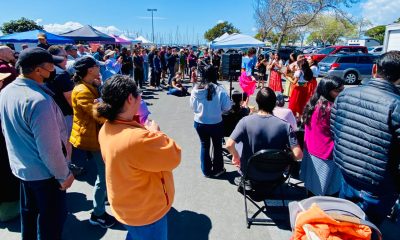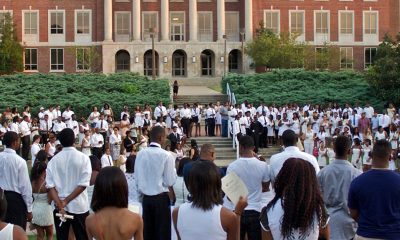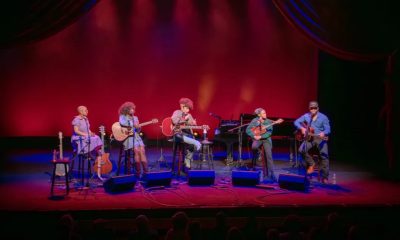Music
New Sardis Baptist Church Honors “Memphis Living Legends”
THE TENNESSEE TRIBUNE — On Sunday morning, Feb. 24, New Sardis Baptist Church invoked the spirit of African-American ancestry coupled with Afro-centric music.
By Wiley Henry
MEMPHIS, TN — On Sunday morning, Feb. 24, New Sardis Baptist Church invoked the spirit of African-American ancestry coupled with Afro-centric music and the unadulterated Word of God. This was the culmination of African-American History Month and the presentation of the church’s annual Memphis Living Legends program.
The morning worship service was devoted to the men and women whom the church honored and celebrated for blazing a path in their respective fields and making significant contributions in Memphis and beyond.
“We honor men and women who have made our society better,” said the Rev. Dr. L. LaSimba M. Gray Jr., New Sardis’ pastor emeritus and worship leader for the morning celebration.
Donning African attire, the church’s leadership team – headed by its pastor, the Rev. Darell Harrington – welcomed the 2019 Living Legends: State Rep. Karen Camper, Captain Albert T. Glenn, Dr. Howard Glenn, Bishop William Graves Sr., Estella Mayhue-Greer, Henry Hooper, Bobby O’Jay Jones, Clarence Jones, Jerry C. Johnson, John McFerren, Tajuan Stout-Mitchell, the Rev. Dr. Rosalyn R. Nichols, Rosetta Hicks Peterson, Dr. Larry Robinson, Mark Russell, Dr. Theresa James Shotwell, Madeleine C. Taylor and Fayth Hill Washington.
Jimmy Ogle, Shelby County’s historian and past chairman of the Shelby County Historical Commission, presented The Frances Wright Award. Wright was a 19th century Scottish-born abolitionist, social reformer, lecturer, freethinker and writer.
Honoring “living legends” was the brainchild of Dr. Erma L. Clanton, a playwright, lyricist, former teacher and member of New Sardis. The inaugural salute to living legends began in 2003 after Clanton, now 96, pitched the idea to Gray.
Celebrating black achievement in the U.S. first began in 1926 as Negro History Week – the precursor of Black History Month – founded by Carter G. Woodson, an historian, author, journalist and founder of the Association for the Study of African American Life and History.
Of course, James Weldon Johnson’s “Lift Ev’ry Voice and Sing,” known as the “Black National Anthem,” was integral to the program – as it is each year – and key to setting the tone for the morning.
“Everybody here today – black, white, blue or green – that’s your native land,” said Gray, referring to the continent of Africa. “Native land should be replaced with Africa because we all came from the continent.”
Harrington posed the question: “How does our history impact the relevance of our present?” and composed his message, “The Transformative Power of Truth,” from John 8:31-36.
Recognizing the history of black contributions throughout his sermon, Harrington referred to the passage in John when Jesus said to the Jews who believed Him, “If you abide in My word, you are My disciples indeed.” Then he added: “And you shall know the truth, and the truth shall make you free.”
“What does it mean in the 21st century to be free?” Harrington asked the congregation. He followed up with an answer to the question: “It should mean you ought to serve God.”
He said Black people have offered the world the best that the world has to offer and added, “It’s easy to forget one’s history. It’s easy to forget because we’ve become comfortable.”
Using as an example, he said, “It was illegal to write, but God made a way.”
Harrington continued to espouse the relevance and cultural significance of black pioneers and trailblazers, and undergirded the message with the importance of keeping God first.
“We celebrate black history,” he said. “But we have to celebrate a risen Savior.”
This article originally appeared in The Tennessee Tribune
Arts and Culture
Kedrick Armstrong: New Music Director for the Oakland Symphony
The Oakland Symphony Announced Kedrick Armstrong as its Next Music Director. In addition to conducting the orchestra’s public concerts, Armstrong will also actively participate in the Oakland Symphony’s many education and community engagement programs, designed to inspire a love of music in people of all ages.
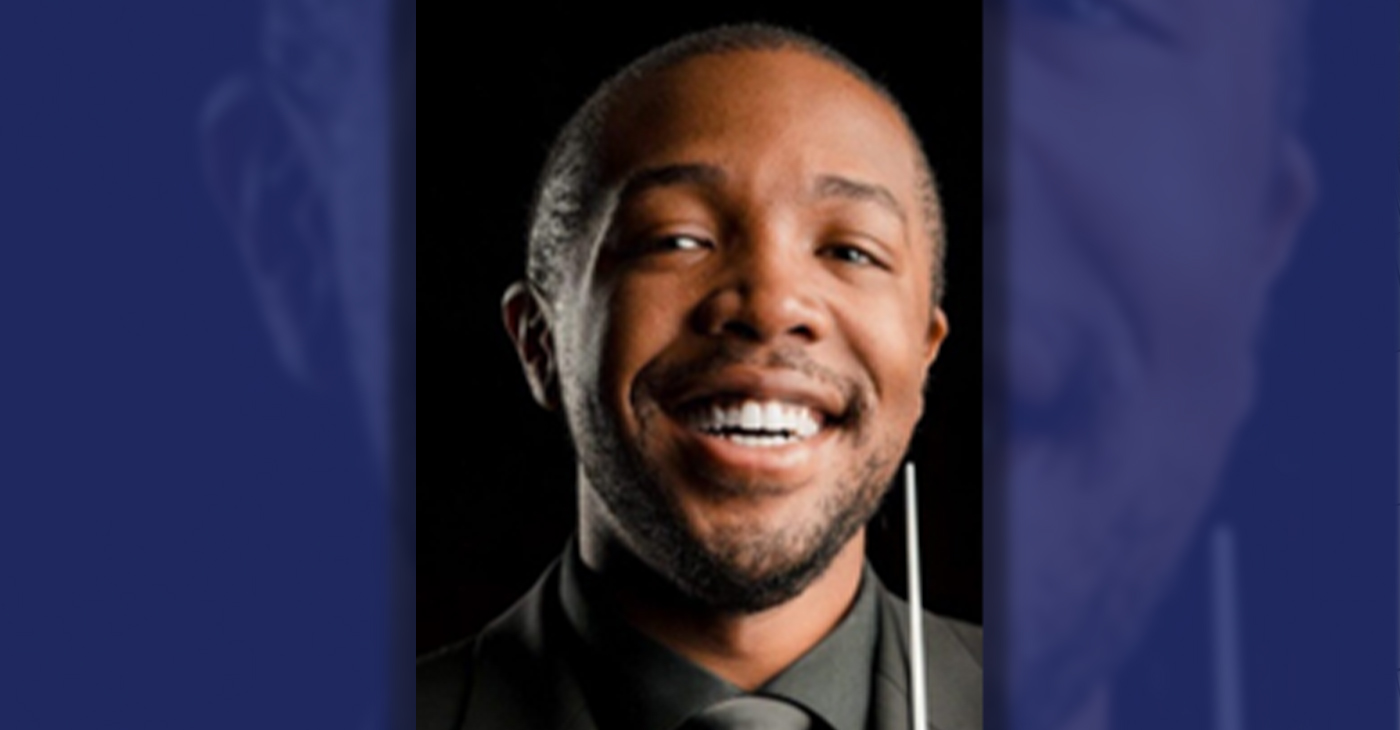
By Post Staff
The Oakland Symphony Announced Kedrick Armstrong as its Next Music Director.
In addition to conducting the orchestra’s public concerts, Armstrong will also actively participate in the Oakland Symphony’s many education and community engagement programs, designed to inspire a love of music in people of all ages.
Armstrong is the successor to previous music director and Conductor Michael Morgan, who passed away in 2021 after a 30-year tenure at the Symphony.
Armstrong will open the Oakland Symphony 2024-2025 season on October 18.
Armstrong, who is 29 and hails from Georgetown, South Carolina, is currently the creative partner and principal conductor of the Knox-Galesburg Symphony.
The Chicago Tribune has praised Armstrong for his ability to “simply let the score speak for itself.” He enjoys a wide range of repertoire, spanning early music to premiering new works, using his joy and curiosity for all music to cultivate understanding and collaboration within diverse communities.
“I am deeply honored and grateful for the opportunity to serve as the new music director of the Oakland Symphony,” Armstrong said. “As a Black conductor, I find it humbling to stand on the shoulders of both Michael Morgan and Calvin Simmons,” the most recent and the first African American music directors of the Symphony, respectively.
Armstrong led three programs at the Symphony between 2022 and early 2024, which showcased his broad knowledge of the classical repertoire and enthusiasm for spotlighting diverse voices.
On his Oakland Symphony subscription debut on Feb. 16, Armstrong led the world premiere of “Here I Stand: Paul Robeson,” an oratorio by Carlos Simon on a libretto by Dan Harder, commissioned by the Oakland Symphony.
Armstrong was selected unanimously by the Oakland Symphony’s board of directors and musicians after an extensive two-year search. “The search committee was overwhelmed by Kedrick’s scholarship and curiosity about all kinds of music, from classical and jazz to gospel and hip-hop,” said. Dr. Mieko Hatano, executive director of the Oakland Symphony. “We are thrilled to have him join us at the Oakland Symphony.”
Arts and Culture
Faces Around the Bay Dr. Carl Blake, Pianist
Born in Liberty, Missouri, Carl Blake, a virtuoso and respected pianist, made his most recent migration to the East Bay in 1999. One might have seen him performing recently at Noontime Concerts in San Francisco, or at the Piedmont Center for the Arts in Oakland. He is Director of Music at The Church for the Fellowship of All Peoples in San Francisco. He was also co-organizer and collaborative pianist at Herbst Theater for The Majesty of the Spirituals concert in 2022 and has held several church positions in the Bay Area.
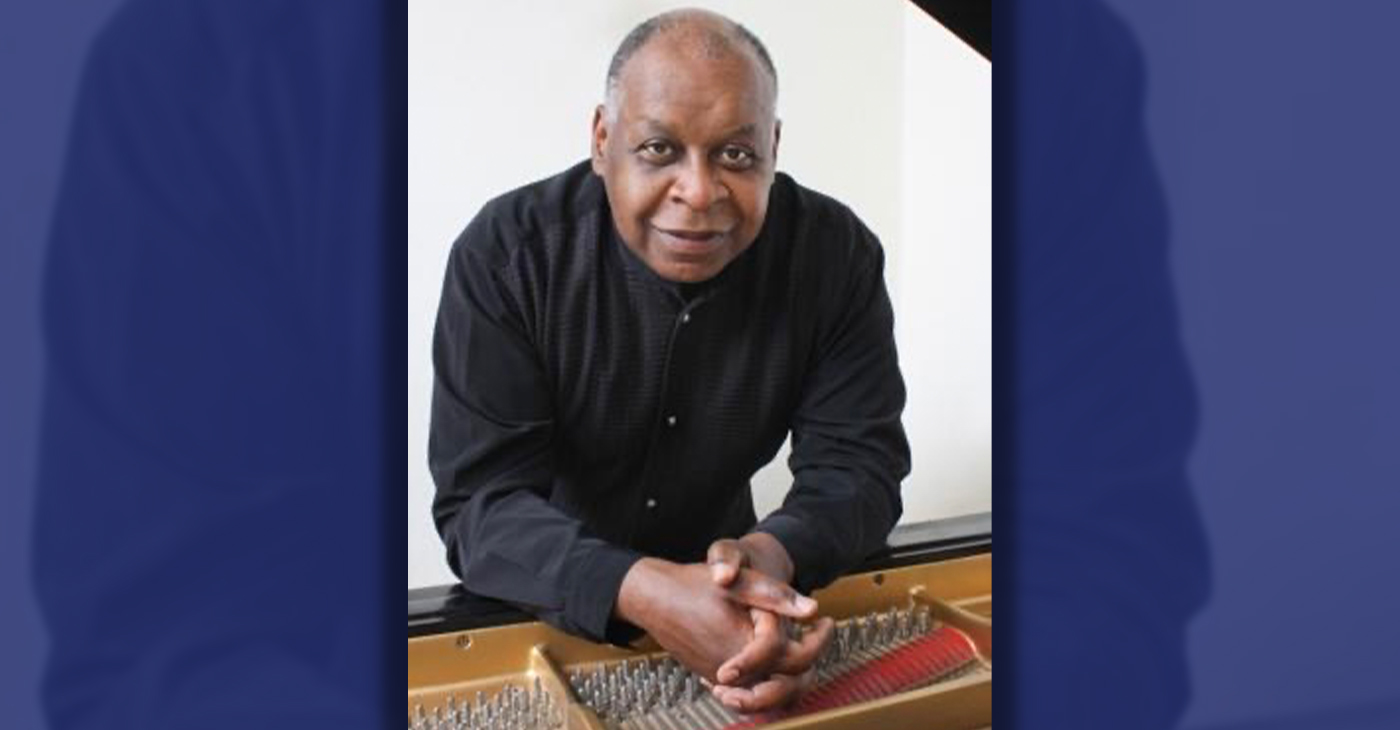
By Barbara Fluhrer
Born in Liberty, Missouri, Carl Blake, a virtuoso and respected pianist, made his most recent migration to the East Bay in 1999.
One might have seen him performing recently at Noontime Concerts in San Francisco, or at the Piedmont Center for the Arts in Oakland. He is Director of Music at The Church for the Fellowship of All Peoples in San Francisco. He was also co-organizer and collaborative pianist at Herbst Theater for The Majesty of the Spirituals concert in 2022 and has held several church positions in the Bay Area.
Blake obtained a Bachelor of Music from Boston University and continued post-baccalaureate studies in Jamaica before earning a Master of Arts in Music at San Jose State University. He was the recipient of two Fulbright residencies in Honduras and completed a third residency at the University of St. Petersburg in Russia. He has a Doctor of Musical Arts from Cornell University.
At age 19, Blake, then an undergraduate piano major at Boston University, was “discovered” by Impresario Dr. W. Hazaiah Williams, who is the Founder and Director of Today’s Artists/Four Seasons Arts.
Williams honored Blake by awarding him the first Marian Anderson Young Artist Award. Anderson personally presented the award at the Masonic Auditorium in S.F. Subsequently, Blake was presented by Dr. Williams in his San Francisco debut at The Herbst Theatre. Williams subsidized a year of study abroad for Blake at the Paris Conservatory of Music. Additionally, Williams sponsored Blake’s New York Weill Hall debut, where he has performed twice since. Blake performed several times at the Yachats Music Festival in Oregon.
Blake continues to perform nationally and abroad. His hobbies are reading, baking and travel. He says, “I’m still pumping ivories, as Belgian pianist Jeanne Stark described the disciplined practice of concert piano.”
Arts and Culture
Oakland Jazz Great Offers Master Class as City Declares “John Handy Day”
World-renowned jazz master saxophonist John Handy, a McClymond’s High School graduate, was presented with a Mayor of Oakland Proclamation declaring Feb. 12, as John Handy Day in the city. Handy is most notably known as the featured saxophonist for Charles Mingus on “Goodbye Pork Pie Hat” from the album “Mingus Ah Um” (1959) and on “Hard Work” from his own album “Hard Work” (1976).
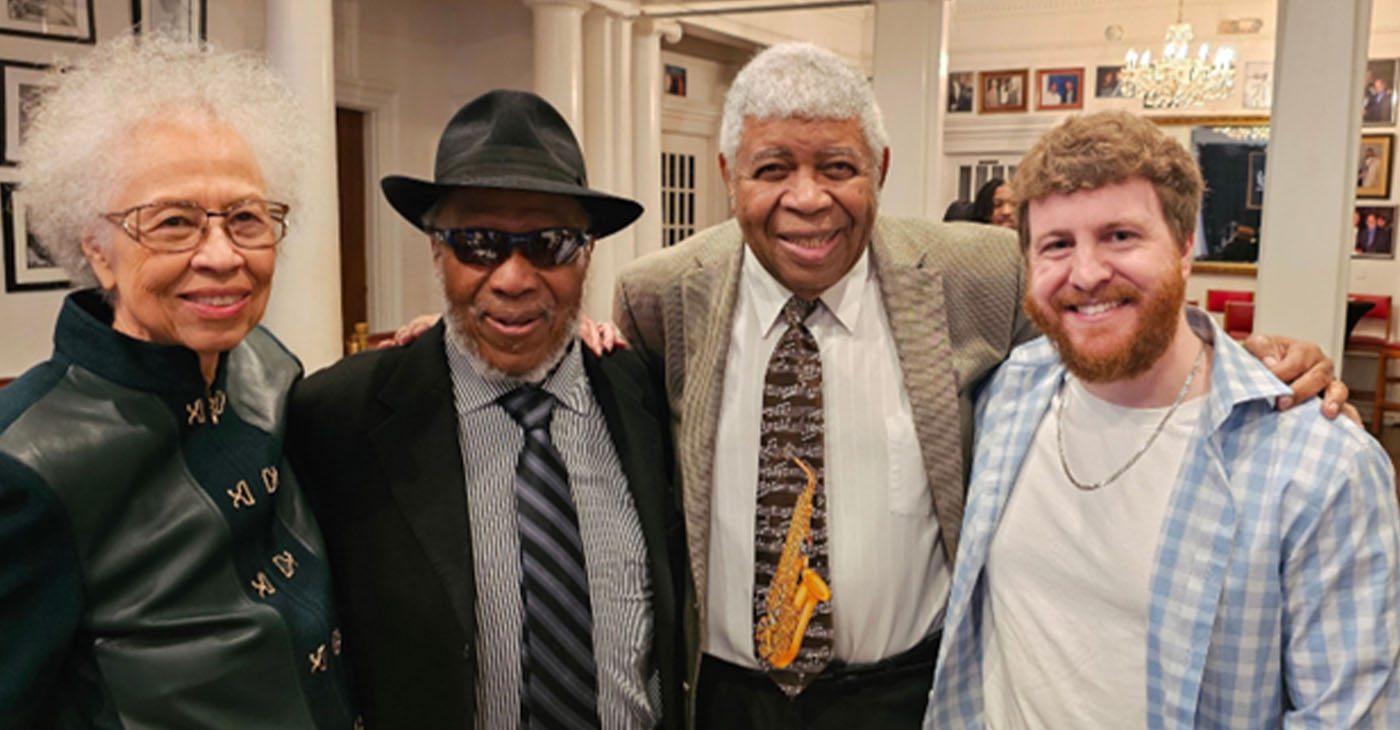
By Conway Jones
World-renowned jazz master saxophonist John Handy, a McClymond’s High School graduate, was presented with a Mayor of Oakland Proclamation declaring Feb. 12, as John Handy Day in the city.
Handy is most notably known as the featured saxophonist for Charles Mingus on “Goodbye Pork Pie Hat” from the album “Mingus Ah Um” (1959) and on “Hard Work” from his own album “Hard Work” (1976).
“John Handy is a jazz icon and an inspiration to musicians everywhere,” said Ayo Brame, a 16-year-old Oakland tenor saxophone player who is enrolled at the Oakland School for the Arts.
In celebration of this day, the reception in downtown Oakland at Geoffrey’s Inner Circle was a gathering of artists, young and old, coming together in his honor and celebrating his 91st birthday.
Handy presented a Saxophone Colossus free masterclass for musicians. This class afforded a rare opportunity to learn about the saxophone from an aficionado. The class was free and open to all – saxophonists, vocalists, aficionados, students, and casual listeners.
“As a longtime friend for over 60 years, and fellow musician who has had numerous opportunities to share the stage with John, it has always been a pleasure performing with him and hearing his creative interpretations of the music and his gift of ease inspiring the next generation of jazz musicians,” said Roger Glenn, a multi-instrumentalist.
-

 Community2 weeks ago
Community2 weeks agoFinancial Assistance Bill for Descendants of Enslaved Persons to Help Them Purchase, Own, or Maintain a Home
-

 Activism3 weeks ago
Activism3 weeks agoOakland Post: Week of April 3 – 6, 2024
-

 Business2 weeks ago
Business2 weeks agoV.P. Kamala Harris: Americans With Criminal Records Will Soon Be Eligible for SBA Loans
-

 Community2 weeks ago
Community2 weeks agoAG Bonta Says Oakland School Leaders Should Comply with State Laws to Avoid ‘Disparate Harm’ When Closing or Merging Schools
-

 Activism2 weeks ago
Activism2 weeks agoOakland Post: Week of April 10 – 16, 2024
-

 Community1 week ago
Community1 week agoOakland WNBA Player to be Inducted Into Hall of Fame
-

 Community1 week ago
Community1 week agoRichmond Nonprofit Helps Ex-Felons Get Back on Their Feet
-

 City Government2 weeks ago
City Government2 weeks agoLAO Releases Report on Racial and Ethnic Disparities in California Child Welfare System


